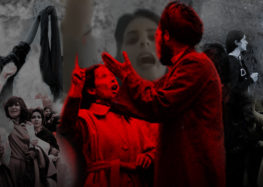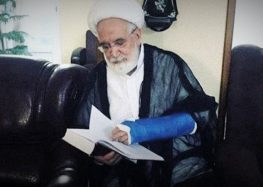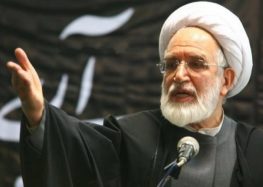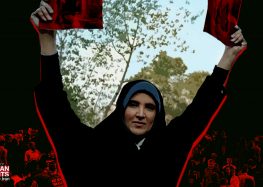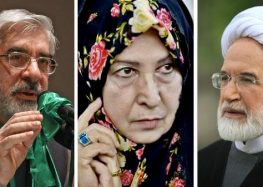Mehdi Karroubi: Despite Five Years of House Arrest, He Continues to Speak Out against Abuse of Power in Iran
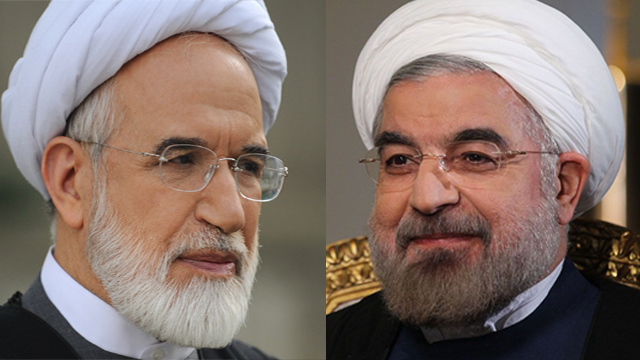
Former presidential candidate Mehdi Karroubi, who has been living under extrajudicial house arrest for over five years for contesting the result of Iran’s widely disputed 2009 presidential election, has written an open letter to President Hassan Rouhani calling on him to convince the “ruling dictatorship” to allow Karroubi to stand trial.
“Unfortunately in both the [2005 and 2009 presidential] elections, the interference by a faction within the Revolutionary Guards, the Basij militia, and the Intelligence Ministry trampled the rights of the dignified people of Iran as well as mine and imposed a lying trickster [Mahmoud Ahmadinejad] … on this country and paved the way for the most corrupt government since the [1905] Constitutional Revolution,” he wrote in the Karroubi-affiliated Saham News website.
“I do not expect you to end my house arrest,” said Karroubi, addressing Rouhani. “This is not in your realm of responsibility. But I do want you to act according to your duty to the Constitution and the people and ask the ruling dictatorship to try me in an open court based on Article 168 of the Constitution… so that with God’s help, along with my lawyers, I would be able to present evidence to prove fraud in the 2005 and 2009 presidential elections and show the people what has befallen the children of this country in legal and illegal detention centers.”
In a reference to Iran’s supreme leader, Ali Khamenei, Karroubi added: “… this trial will make it clear who has disgracefully turned his back on the revolution and who is continuing on the revolution’s path with dignity. It will show who is on which side of the argument over the result of the 2009 elections.”
On March 10, 2016 Khamenei made an off-handed reference to the three Green Movement leaders held under house arrest, which include Mir Hossein Mousavi, and Zahra Rahnavard, by praising the “dignified reaction of those who didn’t get enough votes” in Iran’s February 2016 elections, “as opposed to the undignified reaction of those who didn’t win enough votes in the 2009 elections and started a fight and dragged people onto the streets and caused a confrontation and harmed the country and made our enemies more rabid in plotting against us.”
“What they started was no small plot that was put out with the Grace of God,” added Khamenei.
Iranian officials initially placed former presidential candidates Mir Hossein Mousavi and Mehdi Karroubi, along with their wives Zahra Rahnavard and Fatemeh Karroubi, under house arrest on February 14, 2011 after they called for demonstrations in support of the popular uprisings in the Middle East, which came to be known as the “Arab Spring.” While officials released Fatemeh Karroubi, the other three have remained under house arrest for over five years without charges or trial.
Mousavi, Karroubi and Rahnavard have since become Iran’s most popular, though muzzled, opposition leaders along with reformist former president Mohammad Khatami, who is not under house arrest but is prohibited from public speaking.
Only close family members have been permitted brief and heavily guarded visits with the opposition leaders. Throughout their detention both Mousavi and Karroubi have suffered increasingly serious health issues, but the authorities have not permitted them to receive full medical treatment.
None of the three detained dissidents has been charged with any crime, nor have they had any trial. In addition to Iranian activists and international human rights groups, several different bodies of the United Nations have repeatedly urged the Iranian government to release them, including the UN Working Group on Arbitrary Detention and the UN Special Rapporteurs on human rights in Iran.
Karroubi’s letter, the authenticity of which has been confirmed by his son, Mohammad Taghi Karroubi, has been met with fiery responses from hardline and conservative news outlets in Iran.
Javan newspaper, a mouthpiece for the Revolutionary Guards, published a brief commentary on April 11, 2016 telling Karroubi that his house arrest has been a legitimate form of punishment for all enemies of the state since the era of the leader of Iran’s Islamic Revolution, Ayatollah Rouhollah Khomeini.
“Don’t you want to revive the golden era of the late Imam [Khomeini]?” wrote Javan’s commentator. “Aren’t you proud you received dozens of titles from his grace? Now the Islamic Republic is taking you back to that era and showing you a small example of how the Imam treated those who rebelled against the state… You should pray for Seyyed [Ali Khamenei] for nicely calling you undignified. Back in the golden era, all of you would have been hanged with a short command.”
Iranian officials often refer to the Khomeini era to justify crackdowns on their opponents.
“These disgraced individuals [Mousavi, Rahnavard and Karroubi] are detained in their home but they have television sets and other amenities. If it wasn’t for Islamic mercy, they should have been executed,” said the Guardian Council’s (charged with vetting election candidates) ultra-conservative chairman, Ayatollah Ahmad Jannati, during a Friday Prayer sermon on November 22, 2013.
“Those who defend these individuals should tell us why then does the Quran and our theological books demand execution for those who corrupt the Earth?” he added.
“If a person takes out a knife and threatens the security of a neighborhood, he will be condemned and executed. But those who made our country insecure for eight months and killed our Basij militia youths [the volunteer paramilitary arm of Iran’s Revolutionary Guards] don’t deserve capital punishment? Don’t you have any shame in defending them?” said Jannati. “They owe it to the state for allowing them to live in their home with amenities and health care. But these individuals still refuse to apologize for their actions.”
“When [Mojahedin-e Khalgh] [an outlawed opposition group seeking regime change] members stood by their beliefs, the late Imam [Khomeini] ordered their execution,” he added. “Today these individuals are still holding on to their viewpoints, otherwise we could have had a solution.”
In June 2014, outspoken conservative MP Ali Motahhari said he objected to the opposition leaders’ continued house arrests during a meeting with Khamenei, who replied, “Their crimes are much bigger than their punishment.”
“If the Imam [Khomeini] was alive he would have been harsher,” said Khamenei. “If these individuals were put on trial, they would face heavy punishments, which you would not be pleased with. We are being kind to them.”
Karroubi’s Stinging Letters
The open letter has long been a popular means of expression by critics and political opponents in Iran. The indictments contained within the dozens of letters written by Karroubi over the years have been unprecedented from someone of his position in the history of the Islamic Republic.
Karroubi has written many letters about the arbitrary nature of Iran’s vetting process of election candidates. These letters date back to the early days of Khamenei’s appointment as Iran’s supreme leader in 1989 by the Assembly of Experts, when some close advisers to Khomeini and his son, including Karroubi and his allies, were being pushed outside Iran’s political arena.
In March 1998, when he was chairman of the Combatant Clergy Association, Karroubi wrote a letter to Jannati—who was already chairman of the Guardian Council, a title he still holds today—criticizing the disqualification of reformist candidates.
“In my humble opinion and that of many of those concerned about the Islamic Revolution, the current mandatory vetting process will have serious and unpleasant consequences as we see here and there today, which could get worse in the future,” wrote Karroubi. “This is not in the interest of the holy Islamic Republic or the honorable institution of the Council of Guardians.”
Six months later, during the election for the Assembly of Experts, Karroubi wrote to Jannati again, asking: “Why are the candidates who need to be tested for their theological aptitude not being tested, but those with undisputed theological qualifications are being tested and/or rejected?” (Hamshahri newspaper, October 14, 1998)
Jannati wrote back: “It is our belief that problems can be solved with reason and understanding and reliance on the law… But if no solution is reached, the country will not be rudderless. With the authority given to him by Islam and the people, the supreme leader can, has and will solve the biggest problems facing the country.” (Result newspaper, October 25, 1998)
Earlier that year Karroubi wrote a letter to Khamenei and criticized the arrest of Tehran’s mayor, Gholamhossein Karbaschi, and other supporters of President Mohammad Khatami’s reformist government.
“We believe it is clear that those who have created the municipality scandal are trying to weaken Mr. Khatami’s government in a vain attempt to draw the people inside themselves. But what this will do instead is embitter the people who had so much hope in [Khatami’s election] and discourage them from all-out participation in the country’s development. It will also weaken the position of the Islamic Republic in the international community after gaining so much strength after the [1997] presidential elections. Surveys show that despite all the noise, people have recognized that the real motive is to prevent Khatami from doing his job.” (Hamshahri newspaper, April 20, 1998)
Karroubi’s Evolution
Karroubi was often accused by impatient reformist MPs of being too conservative when he was speaker of Iran’s sixth Parliament (2000-2004). He wasn’t even supported by the reformist faction during his bid to lead the legislature. After he became speaker, he came under intense criticism for bending to Khamenei’s demand to prevent Parliament from amending the country’s draconian press law. In fact, the sixth Parliamentary session was virtually paralyzed, incapable of ratifying any progressive laws because of repeated vetoes by the conservative Guardian Council.
In the June 2005 presidential election, growing displeasure with Karroubi resulted in him losing the backing of the reformists, who instead fronted Mostafa Moin, a technocrat with little popular support. That year Mahmoud Ahmadinejad won the presidency by a wide margin, thanks to what was seen as widespread intervention by the Revolutionary Guards and the Basij militia in the first round of the election.
In an open letter to Khamenei, published on June 19, 2005 by BBC Persian after the first round of voting, Karroubi wrote: “When I found out that some institutions of power were determined to change the people’s vote, I gave an interview and based on Article 57 of the Constitution I requested that you give the appropriate order to correct the wrongs that were taking place.”
“The office of Your Highness has given me your reply as follows: ‘Tell Mr. Karroubi that I looked at his main points. The things you have said are completely beneath you and the intention is to create a crisis in the country. Are you aware of what you are doing?… I never expected this behavior from you and with God’s help I will not allow anyone to create a crisis in this country’.”
Referring to a sudden increase in his opponents’ votes after Karroubi received the most votes during the initial hours of the first round of voting, Karroubi wrote: “In a hurried interview worthy of a coup attempt in the early hours of the morning, the spokesman for the Council of Guardians made it clear that some centers of power and influential individuals are not happy with the announcement of the election results through the Interior Ministry’s lawful channel. I contacted Interior Ministry officials at 8:30 in the morning and they too were surprised by the interview, which was supposedly aired without the knowledge of the state broadcaster’s managers, and they told me that based on the final count sent from the polling stations that was entered into the computers of the Interior Ministry, I am still in first place.”
“Previously I did mention in your presence the possible interference of some factions of the Revolutionary Guards and Basij [in the election] and based on what I have heard, ministers of the interior, intelligence and justice have also sent you a letter about this and have asked that you take the necessary steps to prevent this,” he added.
Karroubi also indirectly accused Khamenei’s son, Mojtaba, of meddling in the election and wrote: “Your Eminence is well aware that in previous years the thoughtless interference of those in the circle of ruling clerics and political officials has resulted in many negative consequences for the country and the state. Therefore, with all sincerity, care and respect I beg Your Eminence not to allow such bitter experiences from happening again.”
In his letter, which went unanswered, Karroubi also announced his resignation from all official posts and pledged to start his own political party, Etemad Melli (National Trust).
Many more open letters by Karroubi followed.
In May 2006, after the publication of Ahmadinejad’s letter to President George W. Bush, Karroubi criticized Jannati for praising Ahmadinejad’s “divine inspirations.”
“As a pious man, are you not worried that exaggerations about the relationship between God and His creatures would weaken the people’s faith?” wrote Karroubi. “Your words [in praise of Ahmadinejad] in the Friday Prayers sermon undermine your status as a student of the Imam [Khomeini] and the seminary schools and may give people the impression that the clergy have joined the ranks of inflators and pranksters.”
In March 2009, Karroubi wrote an open letter to the Intelligence Ministry condemning the destruction of places of worship belonging to Gonabadi Dervishes.
“In the past three years, places of worship in Qom, Karaj, Isfahan, Boroujerd and… have been attacked and destroyed. Which fair court issued the order? Can you take such actions without legal procedures? What was the religious and civil basis for these attacks?” asked Karroubi.
“Three years ago there was a similar incident in Qom, where the authorities claimed that the building they destroyed was an endowment and yet the owner is very much alive and had donated the space to the Sufis,” he added.
Karroubi’s Last Stand
Following the widespread protests against the disputed results of Iran’s 2009 presidential election, Karroubi not only publicly accused the authorities of fraud in naming Ahmadinejad as the victor, but also condemned the violent treatment of protesters.
In an open letter addressing former centrist President Akbar Hashemi Rafsanjani, who unsuccessfully ran against Ahmadinejad in 2005, Karroubi detailed incidents of rape: “What I am telling you is what I have been told by officials who hold sensitive positions. They are members of important forces, and some of them have fought in the holy [Iran-Iraq] war.”
“They told me something has happened in the prisons and if just one case turns out to be true, it would be a catastrophe for the Islamic Republic and turn the bright and unadulterated history of Shia clergy into a dark and shameful saga. It would restore the reputation of disgraced dictatorships, namely the Shah’s cruel monarchy,” wrote Karroubi.
“Some of the detainees have said that some individuals have raped the female detainees with such violence that they caused tears in their reproductive organs,” added Karroubi. “On the other hand, these individuals have also attacked young men so savagely that the young men were left clenching their bodies in a corner of their home with serious psychological and physical scars.”
“Given the importance of this matter, one would expect that an impartial and transparent commission would be set up by the Assembly of Experts to investigate,” said Karroubi.
Karroubi also wrote to Tehran’s Prosecutor General Abbas Jafari Dolatabadi on May 9, 2010 expressing concern over reports that Mohammad Davari, the editor of the reformist Saham News who was at that time in his eighth month of detention, was being tortured to give false confessions.
Davari was imprisoned for helping Karroubi document the rape victims’ testimonies.
“What is the benefit of forced confessions and apologies? I hereby inform you and others that I am solely responsible for all the documents and video clips I have provided showing instances of rape and torture. Neither Mr. Davari nor anyone else are involved and therefore there’s no need to try to make them confess,” wrote Karroubi.
“The interrogators should give it up and not work too hard. Weren’t all these dark incidents enough? Now they are conducting character assassinations against people like the person who only filmed the incidents. I take responsibility for everything. I do not know how aware you are of the evidence I have presented since these incidents took place, but a person in your position should be very much informed about this matter,” said Karroubi.
In another open letter published on July 21, 2010, this time addressing Ayatollah Mohammad Momen, a member of the Guardian Council, Karroubi regretted that “the Council of Guardians had planted the seed of cheating in the country” adding: “There are many questions of historical significance that exist in the minds of the Iranian people regarding the work of the Council of Guardians, questions that should be answered at some appropriate time. Namely there are questions about the contradictory interpretations of Sharia and the Constitution regarding parliamentary legislations, the mass disqualification of candidates for the way they think or for belonging to certain political factions, and the administration of the elections.”
“You surely remember that in the fifth Parliamentary election, in the Meybod and Ardakan constituency, some of the votes for the winner were invalidated and instead his opponent was sent to Parliament, or the sixth Parliamentary election in Fereydoun Kenar, where vote rigging led to bitter incidents,” wrote Karroubi.
“Unfortunately, one must admit that all these incidents were perpetrated by the Council of Guardians. I am sorry to say to the honorable members of the Council that I am reminded of the anecdote about the man who complained about being called a thief, and said in his defense, “I don’t know why all the things I am accused of stealing from the neighborhood are found in my home!” wrote Karroubi.
“I invite you to look into the actions of the Council and the state in the ninth presidential elections when the seed of cheating was planted in the country under false pretexts by the monitoring and executive institutions, and look into the tenth presidential elections when obvious fraud led to waves of angry protests as people demanded their rights,” added Karroubi. “Considering the destructive impact on the country and the state, is it not time to review and reform the Council’s attitude?”
In an open letter to Jannati during that same year Karroubi rejected the accusation that he had caused a rebellion after the 2009 presidential election.
“The so-called sedition you keep harping about was the election engineered, as usual, by you and your think tanks in the Council of Guardians and the Interior Ministry… with the intention of bringing about a favorable result,” he said.
Iran’s Green Movement, which the government tried to forcefully and violently crush through arbitrary arrests and imprisonments, rose out of the peaceful protests against the widely disputed results of the 2009 presidential election. The movement is still a highly sensitive subject in Iran, referred to by hardliners as “the sedition.”
“But as God Himself is most clever, your plans did not succeed and the holders of power got an unexpected result. The strange concoction that you quickly poured down the nation’s throat caused a backlash and exposed your rubber-stamped elections. Then, unbelievably, and despite your pledge to respect the people’s votes, you and those who engineered the election results suppressed the people’s protests in the most severe and violent fashion,” said Karroubi.
“In the culture you have created, the majority of the Iranian people and their assumed leaders, certainly including Mehdi Karroubi, are accused of sedition. But at the same time some individuals have deservedly become infamous for deception, trickery, and murder under the guise of religion. You, without a doubt, are a prime example, if not one who paved the way for them,” he said.

